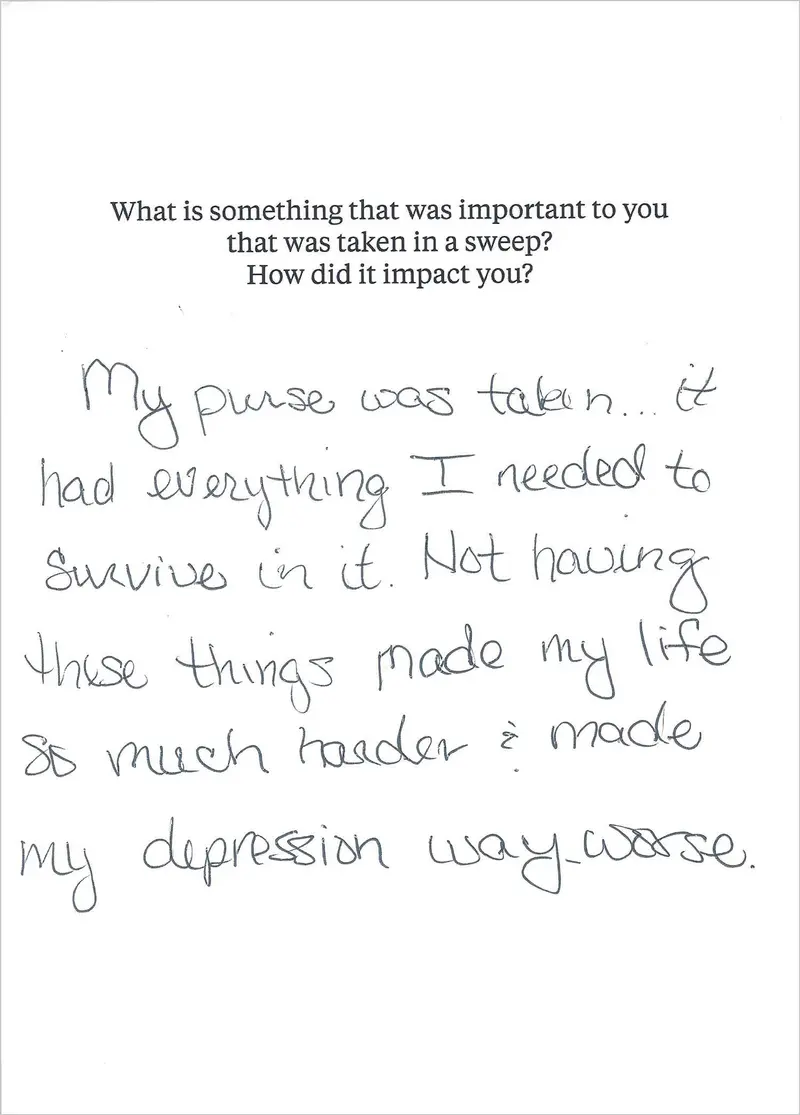Reporting Highlights
- Misplaced Belongings: As cities take away extra encampments, they usually take individuals’s belongings, which may embrace objects wanted to outlive and irreplaceable mementos.
- Storage Packages: Some cities with giant homeless populations have been sued for depriving individuals of their property; in response, they established applications to retailer what’s taken.
- Failed Insurance policies: ProPublica examined such applications and located that folks whose belongings are taken in encampment removals not often get them again.
These highlights have been written by the reporters and editors who labored on this story.
When Stephenie came across staff in Portland, Oregon, who had bagged up all of her belongings in a homeless encampment sweep, she desperately pleaded to get one merchandise again: her purse. It contained her money and meals stamp card — what she wanted to outlive.
The crew refused to search for it, she mentioned. The objects staff had put in clear luggage have been headed to a metropolis warehouse. These in black luggage have been headed to a landfill.
They handed her a card with a telephone quantity to name if she wished to choose up her issues.

Credit score:
Photograph offered by Portland officers
Pregnant and hungry, Stephenie was purported to relaxation and keep away from heavy lifting. She now needed to begin throughout. Within the days that adopted final September, Stephenie slept on a sidewalk for the primary time. She mentioned she tried suicide.
“I had nowhere to go — no place, no tent, no nothing. I couldn’t even feed myself,” she mentioned. “The bottom level I’ve ever been in my life was after the sweep.”
As homelessness has reached disaster ranges, extra cities are clearing tents and encampments in operations generally referred to as sweeps. Since a U.S. Supreme Court docket determination in June allowed cities to punish individuals for sleeping outdoors, even when there’s no shelter obtainable, some have made their encampment insurance policies extra punitive and elevated the frequency of sweeps.
Some cities have applications to retailer what they take, typically created in response to lawsuits. In idea, these storage applications are supposed to guard individuals’s property rights and make it straightforward to get their possessions again.
In actuality, they not often accomplish both goal, in keeping with a ProPublica investigation of the insurance policies in areas with the biggest homeless populations.
ProPublica obtained data from 14 cities exhibiting what was saved following encampment clearings. In Los Angeles and San Diego, hundreds of encampments are eliminated every year, however the belongings taken from them are not often saved, the data confirmed. San Diego, for instance, eliminated greater than 3,000 websites throughout 2023 however solely documented storing belongings 19 occasions. In Seattle, town eliminated practically 1,000 encampments throughout a six-month interval final yr and saved belongings from simply 55 of them.

Credit score:
Asia Fields/ProPublica
Even when possessions are saved, the data confirmed, persons are not often capable of reclaim them. In Portland, which shops essentially the most among the many cities ProPublica reviewed, property was reclaimed 4% of the time throughout a current 12-month interval. In San Francisco, property was reclaimed roughly 12% of the time over 18 months; a lot of what town saved was collected after contact with police. Information offered to ProPublica by Anaheim, California, confirmed nothing had been retrieved from January 2023 by Might of this yr.
Some cities didn’t tackle ProPublica’s questions in regards to the low charges at which persons are capable of retrieve their belongings. However they broadly defended their encampment practices, saying that they steadiness the rights of individuals experiencing homelessness with public well being wants.
In Portland, officers mentioned they handle an in depth database of saved belongings and “share within the collective frustration within the difficulties in managing a system that works properly for everybody.” When requested in regards to the sweep through which Stephenie’s objects have been taken, they acknowledged that camp removals are dangerous to unhoused individuals, however that they need to additionally preserve metropolis property and pure areas.
ProPublica heard from a minimum of 95 individuals who had skilled encampment clearings in cities with applications to retailer belongings. Thirty mentioned they tried to get well their belongings however hit obstacles, equivalent to being unable to achieve anybody on the facility or the location not having the whole lot that was taken. Just one particular person acquired again all of his objects.
The remaining mentioned they didn’t attempt, actually because they didn’t know learn how to go about it, lacked telephones or transportation, or thought, and in some circumstances noticed, that their belongings had already been thrown away.

Credit score:
Asia Fields/ProPublica

Credit score:
Asia Fields/ProPublica
The storage applications provide solely an “phantasm of compassion,” mentioned Barbara DiPietro, senior director of coverage for the Nationwide Well being Take care of the Homeless Council, a nonprofit analysis and advocacy group. Individuals experiencing homelessness usually endure encampment clearings a number of occasions, which “wears a human being down,” DiPietro mentioned. “I’ve by no means heard anybody say they acquired their stuff again.”
Dozens of outreach staff and advocates in cities with storage applications echoed DiPietro’s statements. Advocates and folks with lived expertise mentioned this deprives homeless individuals of belongings they should survive on the road and forces them to reconstruct their lives and procure new identification paperwork when they’re taken.
“The lack of property was the harshest punishment many individuals felt they might face on the road,” mentioned Chris Herring, an assistant professor of sociology on the College of California Los Angeles who researches homelessness.
When Stephenie referred to as to retrieve her belongings final October, nobody answered the storage facility telephone quantity. The road was staffed for restricted hours. She left a message however couldn’t at all times preserve her telephone charged in case somebody referred to as again. When she lastly reached an individual, they offered the tackle and an appointment time. She needed to take a number of buses and stroll to get there.
As she sorted by the massive clear luggage on the warehouse, she realized her tent, most of her tarps and her cooking range weren’t there. Nor was her purse or prenatal nutritional vitamins. Her engagement ring and the notes from her late fiance have been additionally gone.
She left the baggage behind.
“To undergo all that bother to get my stuff again after which to don’t have anything that I wanted there, and to have that determined by any person else who doesn’t even know me, it was traumatizing all in itself,” she mentioned. “It was heartbreaking. It felt like dropping the whole lot once more.”

A Response to Lawsuits
Almost half of the cities ProPublica examined created storage applications in response to lawsuits alleging they’d violated individuals’s property rights by destroying belongings throughout encampment removals. But a few of these cities, together with Phoenix, proceed to throw away possessions, in keeping with advocates and individuals who sleep outdoors.
In December 2022, after a neighborhood advocacy group and unhoused individuals sued town of Phoenix for violating the rights of homeless individuals, a chief U.S. district choose issued an injunction in opposition to seizing their property with out superior discover and ordered town to retailer belongings for a minimum of 30 days.
Town started storing belongings in Might 2023. Since then, it has responded to 4,900 stories from the general public involving encampments, in keeping with metropolis data by Might. Town of Phoenix mentioned staff, skilled to evaluate which objects are property and that are trash, discovered storable property at 405 of the places it visited, and never all of these circumstances required storage as a result of individuals might have eliminated their belongings previous to their arrival. Town saved belongings 69 occasions.
In June, the Division of Justice issued a report following a virtually three-year investigation, discovering that town and its police division destroyed belongings with out offering ample discover or a possibility to gather them. Earlier than property is destroyed, town should present discover, catalog the property and retailer it so individuals can retrieve their belongings, federal investigators wrote.
Benjamin Rundall, who represents the plaintiffs within the ongoing lawsuit, mentioned he’s by no means encountered anybody whose belongings have been saved by town. “It’s simply giving this look that they’re doing one thing after they’re not doing something,” he mentioned.
Over the summer season, Mike Leeth was serving to a pal transfer their issues from a Phoenix alley, leaving his personal camp unattended. He rushed again to search out his personal belongings — clothes, canned meals and canopies for shade — have been gone. “Abruptly, I’m down to at least one set of garments, and I can’t even wash them as a result of I’m at present sporting them,” he mentioned.
Leeth mentioned town has thrown away his belongings a minimum of 5 occasions. He mentioned he’s by no means been instructed that his property could be saved.
Town mentioned in an announcement that staff give discover and retailer unattended property, and that it’s “assured” its processes tackle encampments in a “dignified and compassionate method.”
In different cities, lawsuits have continued lengthy after storage applications have been put into place.
Los Angeles, with the nation’s largest inhabitants of individuals sleeping outdoors, has within the final 30 years confronted practically a dozen lawsuits over the destruction of property in homeless camps, in keeping with court docket data.
A 2019 lawsuit introduced by seven individuals experiencing homelessness and two advocacy teams alleged town has “codified” seizing and destroying belongings, moderately than investing in bogs, hand-washing stations and trash cans for unhoused individuals. In April, a federal choose overseeing the case discovered that town had altered documentation of what crews eliminated throughout cleanups.
Town declined to touch upon the continuing lawsuit.
In response to questions from ProPublica, town of Los Angeles offered information exhibiting that it solely saved belongings 4% of the time throughout a three-month interval in 2023. A spokesperson mentioned town acknowledges the “significance of making certain individuals have their private belongings” and “works to not unnecessarily take away anybody’s belongings throughout cleanings.”
In April, when crews got here to maneuver Ismael Arias from the place he was dwelling on a sidewalk in a Los Angeles suburb, they took his plumbing instruments, a Mexican coin assortment given to him by his father and a baseball card assortment he was planning to present to his son.
A pal drove him to reclaim his issues. On the storage facility, he was given objects to look by. “I mentioned, ‘This isn’t my stuff,’ and so they mentioned, ‘Effectively, that is all we acquired,’” he mentioned. “I used to be like, ‘What do you imply that is all you bought?’”
ProPublica spoke to a few others who tried to retrieve belongings from Los Angeles storage services and located some or all of their issues have been lacking.
Proof in an ongoing lawsuit in San Francisco revealed that staff weren’t instructed learn how to distinguish between private property that’s unattended, deserted property and property that’s combined in with biohazards, Chief Justice of the Peace Decide Donna Ryu wrote. Staff’ selections “seem to present rise to essentially the most disputes,” Ryu wrote in August. Town agreed to raised prepare staff who deal with the belongings of homeless individuals at removals.
The ruling got here weeks after Mayor London Breed promised “a really aggressive” crackdown on encampments. Breed misplaced her race for reelection.
In August, two ProPublica reporters noticed San Francisco public works staff clear an encampment of tents, plastic bins of clothes, a cot and bikes. Nothing was put aside to be saved. One worker did slip into his uniform’s outsized pocket a tin of baseball playing cards taken from the encampment; he then positioned it within the cab of a piece truck moderately than the again, the place different belongings have been stacked. Town mentioned it’s investigating the incident.

Credit score:
Nicole Santa Cruz/ProPublica
Limitations to Claiming Property
In Portland two years in the past, staff took Errol Elliott’s instruments, clothes, electronics and makeshift tent close to the church the place he stayed. He was given details about storage however didn’t have a approach to carry his issues.
“How are you gonna decide it up when you haven’t any automobile and also you’ve acquired 9 luggage of stuff or two massive trunks of instruments?” he mentioned. “How are you purported to get that again? They act prefer it’s really easy to go and get it, nevertheless it’s not that straightforward.”
Portland officers mentioned in this sort of scenario, property was seemingly taken to storage.
However individuals in Portland and different cities instructed ProPublica that even when native officers promise to retailer belongings, they’re usually tough to retrieve. The applications don’t take into accounts the challenges of experiencing homelessness, which embrace lack of entry to transportation and never having a telephone, they mentioned. That is additional difficult by requiring an appointment to retrieve belongings or not extensively distributing the tackle the place objects are saved.
Some cities, equivalent to Seattle, Portland, Anaheim and San Jose, California, don’t publicize the addresses of their storage services due to issues about safety. Phoenix says it delivers belongings to individuals, however data present individuals there are not often reunited with their property.
When individuals do work out the place to go, the journey may be lengthy and require a number of journeys.
In Denver, for example, the storage facility is simply open for restricted hours. Some individuals have trekked to the warehouse solely to be instructed their belongings have been saved off-site and need to be retrieved, mentioned Andy McNulty, an lawyer who sued town on behalf of people that reside outdoors. Once they return they’re instructed that their belongings weren’t saved, he mentioned.
“It’s fairly widespread data to of us on the road now that if town takes your stuff, even when they are saying they’re going to retailer it, it’s gone,” McNulty mentioned.
Town of Denver mentioned that folks obtain a declare slip when their objects are saved after an encampment removing. Flyers with contact info are additionally extensively shared so individuals can organize a pickup, town mentioned.
In Los Angeles, an indication giving discover of a June encampment clearing within the San Fernando Valley directed individuals to name or retrieve their objects from The Bins downtown, which is about two hours away on public transit. A number of individuals mentioned the gap prevented them from getting their issues again or that they have been unable to achieve anybody for extra info on learn how to retrieve them.
Town shops belongings at 10 places throughout Los Angeles, making it much more difficult for individuals to search out their issues.

Individuals who skilled encampment removals and researchers who research homelessness mentioned the applications might be simpler by giving clearer discover, offering trash cans and rubbish pickup and ensuring individuals have detailed directions on learn how to retrieve belongings.
Sonja Verdugo-Baumgartner, an advocate in Los Angeles who mentioned she has skilled sweeps herself, mentioned storage applications might be extra productive if cities put effort into them. “However I don’t see town or anyone being keen to take the time to try this,” she mentioned. “They usually can’t simply do it for a couple of individuals, they should do it throughout the board, for anytime they do a sweep.”
Stephenie, whose belongings have been taken in Portland, mentioned the expertise was crushing.
“It retains you in what we name a ‘homeless rut,’ the place we are able to’t give attention to anything besides being homeless,” she mentioned. “We are able to’t give attention to getting out of it and shifting ahead.”
She now lives in an RV, which makes it simpler to haul her belongings when metropolis staff present up. However she has to maneuver the car each few weeks to keep away from being towed, and discovering a spot to park is difficult. She’s seen extra cement blocks cropping up in parking areas alongside the roadsides.
Maya Miller contributed reporting.










